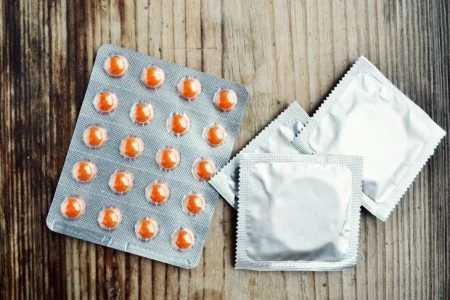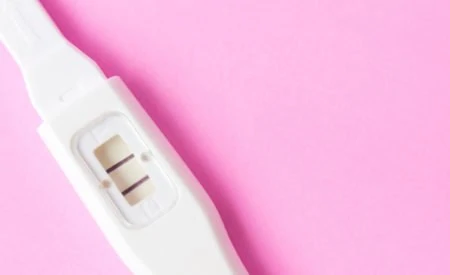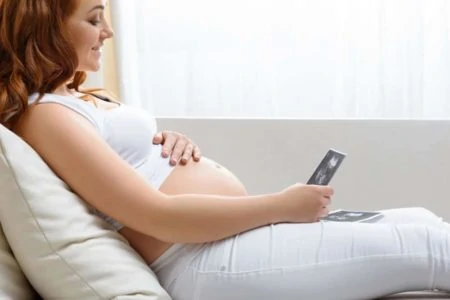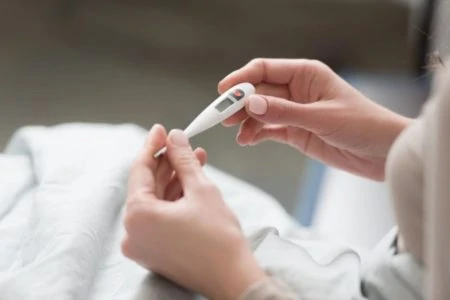Are you looking for the Holy Grail of contraception — a completely foolproof method? Sorry, ladies. Other than abstinence, there is no 100 percent effective method.
Every form of contraception has a chance of failing. So what happens when pregnancy and contraception come face to face?
Let’s explore the different ways contraception can fail, situations where you might stay on birth control even after becoming pregnant, and what happens when you are on birth control while pregnant.
Key Takeaways
- Birth control methods do not harm your long-term fertility. Some research used to suggest being on hormonal contraception for a long time increased your risk of infertility, miscarriage, and birth defects, but this has since been debunked.
- If you use the pill perfectly, it is 99% effective. If you use it as the average user does, it is 91% effective. This means that around one in 10 pill users gets pregnant every year.
- The best way of making sure your pill works effectively is to take it every day at the same time. The pill has been connected to slight short-term memory problems, which can lead to forgetting to take it, so make sure to make it part of your morning or evening routine.
- If you are pregnant and on the pill, the only person who can tell you what to do is your doctor. Depending on your reason for taking the pill, you might be asked to stay on it a while longer, be offered an alternative, or be told to stop it entirely.
Will Contraception Ruin My Fertility?
First of all, let’s get this out of the way — birth control methods do not harm your long-term fertility. Some research used to suggest being on hormonal contraception for a long time increased your risk of infertility, miscarriage, and birth defects, but this has since been debunked.
Do you know what else coincides with being on contraception for a long time? Being older.
It has long been known that the further you are from ages 20 to 35 when you try to become pregnant, the higher your risk of infertility, miscarriage, and birth defects. The slightly higher risks are just the normal risks faced by women of that age. It has nothing to do with contraception!
Older forms of contraception also may have affected women’s fertility, but what was true in 1970 or 1990 is not true in 2024. All these decades of research and new developments mean most contraception is very safe to use.
Studies have shown increased fertility with prolonged use of birth control. One study showed that women who had been on birth control for five years before attempting to get pregnant had a better chance of becoming pregnant than women who were not using birth control (1).
Editor's Note:
Dr. Njoud Jweihan, MDCould I Be Pregnant? I’m on the Pill!
It’s well documented that the pill can fail. If you use it perfectly — take it for a week before having unprotected sex and take it every single day — it is 99 percent effective.
If you use it as the average user does — a few missed pills, unprotected sex a bit too early — it is still 91 percent effective. This means that around one in 10 pill users gets pregnant every year. So yes, you could be pregnant (2).
The most common factor that birth control users find challenging is having to take the pill at the same time every day, and not following that strict schedule can cause it to be less effective.
The best way of making sure your pill works effectively is to take it every day at the same time. The pill has been connected to slight short-term memory problems, which can lead to forgetting to take it, so make sure to make it part of your morning or evening routine.
If you are on a combination pill, take it a week before having unprotected sex. If you are on the mini pill, take it for 2 to 3 days before having unprotected sex.
Important Note
Finally, if you are vomiting, remember that you could have vomited up the pill, making it less effective.
Having irritable bowel syndrome or inflammatory bowel disease such as Crohn’s disease can also decrease the effectiveness of birth control pills because of poor absorption and chronic diarrhea.
Should I Stop Taking the Pill if I’m Pregnant?
The only person who can tell you this for sure is your doctor. Depending on your reason for taking the pill, you might be asked to stay on it a while longer, be offered an alternative, or be told to stop it entirely.
But remember, most of the reasons for taking the pill are related to your period. Acne, mood swings, menstrual cramps, and other problems that are fixed by birth control are probably hormonal and will most likely go away while you are pregnant.
If you are taking birth control pills for conditions such as polycystic ovarian syndrome, endometriosis, or anemia due to heavy menstrual bleeding, make sure to speak to your doctor before stopping the pills, as that can be harmful to your health.
Are There Any Risks if I Am on the Pill?
There is not a lot of human research concerning this, and the existing research is not truly conclusive. It used to be believed that being on birth control while pregnant increased your chances of miscarriage, but this has now been found to be false.
However, some animal studies have found an increased risk of miscarriage, and some human studies have found an increased risk of low birth weight.
If you want to be truly safe, the best option is to stop taking the pill. But if you can’t, or if you didn’t know you were pregnant and were taking the pill, there is no reason to worry.
There is a higher chance of having an ectopic pregnancy, a pregnancy where the fertilized egg implants outside of the uterus, if you become pregnant while on the progestin-only or mini pill.
Could I Be Pregnant After the Implant Too?
Yes, birth control implants can fail as well. There are, on average, 15 pregnancies per 1,000 women who have received the implant.
That means the implant, when inserted correctly, is slightly less effective than the pill.
The advantage? The implant will likely be inserted correctly by a professional, whereas the pill is not always used properly.
Nevertheless, even with an implant, you can get pregnant. This is especially true if you were under 25 years old or weighed over 154 pounds when it was implanted (3).
The implant releases the hormone progesterone to help you avoid pregnancy, but the amount released decreases every year along with the effectiveness of the implant. That is why the implant needs to be replaced approximately every three years.
Editor's Note:
Dr. Njoud Jweihan, MDIs It Safe To Leave the Implant in if I Am Pregnant?
Depending on the implant you have, there are some distinct risks associated with leaving it in when pregnant.
If you become pregnant with an implant inserted, you have a higher-than-average risk of ectopic pregnancy. This is when the fetus implants outside the womb, which can put your life at risk. Your risk of miscarriage is also elevated, even if the fetus implants normally.
For these reasons, it is essential to see your doctor if you feel cramps, have bleeding, or get a positive pregnancy test when you are on the implant. They will then advise you about removing it (4).
Implants and injectable progestins like Depo-Provera will often stop your periods, making it difficult to know if you are pregnant. For this reason, I’d advise paying attention to things like nausea and breast tenderness as possible indicators that you should take a pregnancy test.
Editor's Note:
Dr. Njoud Jweihan, MDCould I Be Pregnant Even With an IUD?
Again — no contraception is perfect, and that includes intra-uterine devices. The IUD is 99.7 percent effective. That means every year, three out of 1,000 women with an IUD will become pregnant.
So the IUD is one of the best contraceptives for preventing pregnancy, but it is still possible to get pregnant with an IUD. The IUD can slip out of the uterus, especially in the first couple of weeks after being inserted, and cause pregnancy. Doctors usually advise checking that the IUD is in the right place at least once a month to make sure it is working.
Stay Vigilant
What Do I Do With My IUD if I Get Pregnant?
If you are pregnant with an IUD, it’s vital to go to your doctor immediately. Like with the implant, there is an increased risk of ectopic pregnancy, which can permanently damage your reproductive system or even kill you.
You are 50 percent more likely to have a miscarriage if the implant is not removed and 25 percent more likely even if it is. It can also lead to a higher chance of infection and premature delivery. You will probably need to monitor your pregnancy very closely to make sure it progresses normally (5).
Can I Get Pregnant if I’m Already Pregnant?
You might have heard of this and be wondering about it, so here goes —yes, you can get pregnant when you are pregnant.
This is very rare, but sometimes one ovary will release an egg, which will become fertilized, and then the other ovary will release an egg a few weeks later, resulting in two babies conceived at different times. Sometimes the babies are not born at the same time, but usually, they are.
And, fortunately, the pregnancy hormones that start two to six weeks after fertilization will stop your ovaries from releasing any more eggs, so a big difference in development is unlikely (6). Other changes that make another pregnancy extremely rare are the thick uterine wall, making it hard for a second fertilized egg to attach, and the mucus plug, which protects the cervix from additional sperm exposure.
In the very rare case of having two pregnancies, the same risks of having twins or multiples apply. These include preeclampsia and premature delivery.
Should I Try To Use Protection if I’m Already Pregnant?
Despite the slight possibility of a double pregnancy, there is no point in using protection to prevent it if you know you are pregnant. By the time you know, the risk is gone.
But the risk of a sexually transmitted disease is still very real, no matter how far along your pregnancy is. And as STDs can affect your pregnancy and long-term fertility, you should use condoms and avoid using oils and lubricants if you are having sex when you are pregnant, especially if you are with a new partner. Make sure to speak to your doctor if you have symptoms or are suspicious of having an infection (7).
Sexually transmitted diseases can cause premature delivery and stillbirth and harm the baby’s organs, leading to blindness, deafness, and brain damage.
FAQs
The Bottom Line
It is super important to not panic about any of this. All the situations described above are pretty rare.
If you are on contraception and your period is late, you are likely experiencing a common side effect of your contraceptive, having a late or missed period, or suffering a hormonal imbalance.
Take a pregnancy test to be on the safe side. Sometimes if you are on hormonal contraception, you can get a false positive, but this is rare, and you are no more likely to get a false negative.
If you aren’t pregnant — no worries. Chances are, you will never experience anything described here.
If you are pregnant, the best course of action is to stop any contraception and talk to your doctor immediately. Remember that whether you want to continue the pregnancy or not, the contraceptive could have some effect, depending on your situation.
Only a doctor can tell you how everything is going and what your options are.










